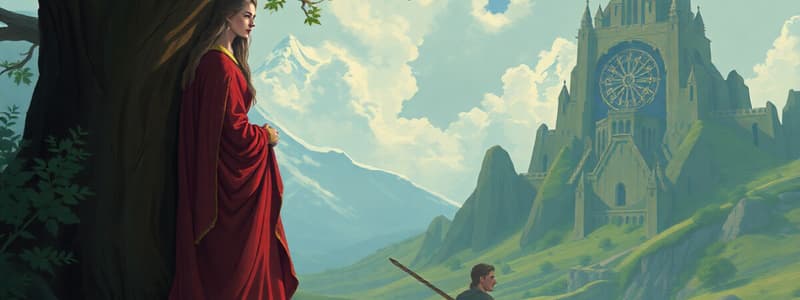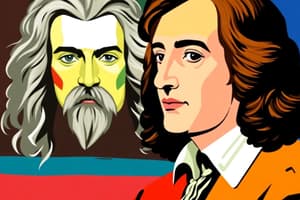Podcast
Questions and Answers
What does Locke argue is the purpose of natural law?
What does Locke argue is the purpose of natural law?
Locke argues that natural law obliges every individual to not harm another in their life, health, liberty, or possessions. He believes that all humans are God's creation, and are therefore equal, and that no one is subordinate to another.
According to Locke, the state of nature is a state of war.
According to Locke, the state of nature is a state of war.
False (B)
Which of the following is NOT a natural right described by Locke?
Which of the following is NOT a natural right described by Locke?
- Right to Property
- Right to Life
- Right to Education (correct)
- Right to Liberty
According to Locke, how is private property acquired in the state of nature?
According to Locke, how is private property acquired in the state of nature?
Why does Locke believe that a monetary system ultimately benefits everyone?
Why does Locke believe that a monetary system ultimately benefits everyone?
Briefly summarize Locke's views on the relationship between natural law and natural rights in the state of nature.
Briefly summarize Locke's views on the relationship between natural law and natural rights in the state of nature.
Flashcards
John Locke
John Locke
An influential English philosopher whose ideas on natural rights and government profoundly impacted Western thought.
Natural Rights
Natural Rights
Basic rights inherent to all human beings, independent of government.
State of Nature
State of Nature
A theoretical concept describing the condition of humanity before organized government.
Natural Law
Natural Law
Signup and view all the flashcards
Property
Property
Signup and view all the flashcards
Tabula Rasa
Tabula Rasa
Signup and view all the flashcards
Glorious Revolution
Glorious Revolution
Signup and view all the flashcards
Constitutional Monarchy
Constitutional Monarchy
Signup and view all the flashcards
Empiricism
Empiricism
Signup and view all the flashcards
Religious Toleration
Religious Toleration
Signup and view all the flashcards
Study Notes
Unit 11: Locke: Natural Rights
- John Locke is an important English political philosopher whose ideas greatly influenced political thought and several constitutions globally.
- Locke was born in 1634 CE and died in 1704 CE.
- Locke's ideas about natural rights and constitutional government are central to Western liberal political philosophy.
- Locke witnessed significant political turmoil in 17th-century England, including conflict between the monarchy and Parliament, and religious tensions.
- Locke was a supporter of Parliamentarians.
- Locke's famous works include An Essay Concerning Human Understanding(1689 CE) and Two Treatises of Government(1689 CE).
- In An Essay Concerning Human Understanding, Locke argued that the human mind is a blank slate (tabula rasa) at birth, and all knowledge comes from sensory experience.
- Two Treatises of Government lays out Locke's views on natural rights and legitimate government, with emphasis on natural law.
- Locke's state of nature is not a state of war, as Hobbes described, but rather a state of peace, goodwill, mutual assistance, and self-preservation, governed by natural law.
- Natural law is a law that is discoverable through reason and based on God's will. Natural law dictates that people are to respect each other's rights to life, liberty, and property.
- Locke's natural rights are pre-political, meaning they exist before government and are granted by God.
- There are three main natural rights: life, liberty, and property.
- Right to life is self-preservation, the right to do anything within natural law to protect oneself.
- Right to liberty is freedom from interference by others, freedom to live according to natural laws.
- Right to property is derived from one's labour: mixing one's labor with natural resources creates ownership. This right is qualified by limitations: 1) one can only appropriate what one can use without waste, 2) one must leave enough for others to survive.
- Locke differentiates between the state of nature and the state of war. While in the state of nature, people are bound by natural law, the state of war occurs when natural law is violated, and individuals resort to self-defense or punishment.
- Locke believed that individuals have a right to judge violations of natural law but need a common judge to ensure that natural law is properly applied in the state of nature. He believed that the presence of a common authority is essential for civil society.
- Locke's theory of natural rights and government had a considerable impact on the development of democratic principles and influenced numerous liberal political thought and constitutions.
Studying That Suits You
Use AI to generate personalized quizzes and flashcards to suit your learning preferences.




